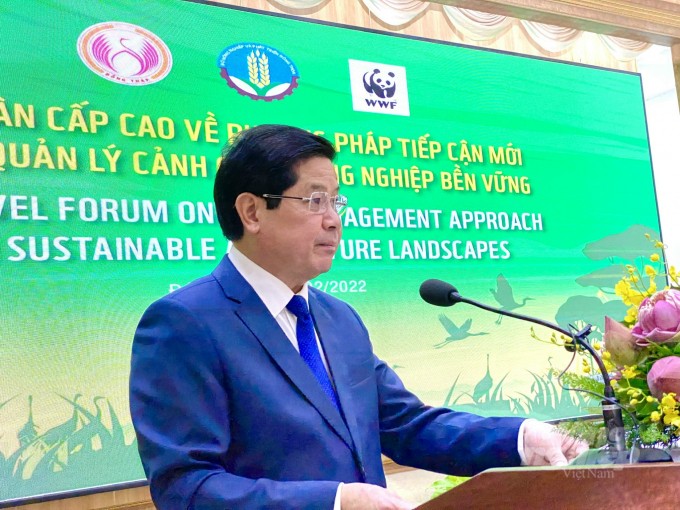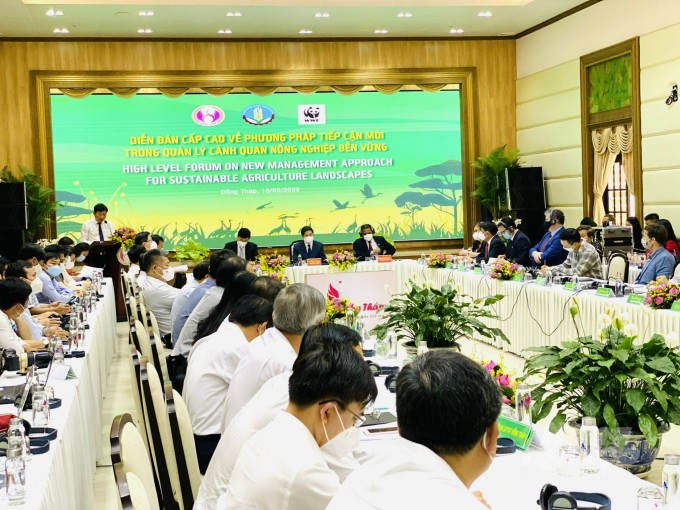- Giới thiệu
- Nhóm Công tác
- Tin tức
- Thông tin về FTA
- Tài Liệu
- Sự kiện
- Liên hệ
A new approach to sustainable agricultural landscapes in Mekong Delta
The People's Committee of Dong Thap province, the Ministry of Agriculture and Rural Development in collaboration with the World Wide Fund For Nature (WWF-Vietnam) held a high-level forum on new approaches to sustainable agriculture landscapes on February 18.

Deputy Minister of Agriculture and Rural Development Le Quoc Doanh, Chairman of Dong Thap People's Committee Pham Thien Nghia, and WWF Global Director Prasanna De Silva co-chaired the forum.
At the forum, stakeholders exchange about new approaches to sustainable agricultural landscapes, learned and shared models of sustainable agricultural landscape development in the world. Good practices implemented in Vietnam can be developed and expanded nationwide. Management and financial solutions for a sustainable agricultural landscape were also recommended.
The forum was also expected to support Vietnamese policymakers and professional agencies with management tools and action plans to jointly implement the agricultural sector’s development tasks and international commitments to achieve the goals of sustainable development.
Speaking at the forum, Deputy Minister of Agriculture and Rural Development Le Quoc Doanh affirmed the determination of the agricultural sector to implement green, transparent and responsible growth goals, without trading of any visible or invisible value for economic growth. Vietnam is transforming the agricultural model along the three axes "Ecological agriculture - Modern rural areas - Smart farmers".

Doanh said that, with the tendency to use multi-sectoral approaches, integrated agriculture with multi-values, a new approach to sustainable agricultural landscape management to ensure the health of people and the planet was paid great attention by many countries around the world.
“As Vietnam aims to achieve the two goals of economic development and sustainability, the country urgently needs new knowledge, lessons on theory and best practices around the world,” he said.
Pham Thien Nghia, Chairman of Dong Thap Provincial People's Committee, outlined the orientations for agricultural and rural development in the Mekong Delta region. The agricultural development must respect the laws of nature, avoid excessive interference in nature, proactively and actively adapt to climate Change.
Localities were urged to identify and promote advantages and potentials of the process of climate change. Thus, together with resources, people, scientific and technological progress of Industry 4.0, they could turn disadvantages into advantages, shifting from productive agriculture to high-tech, ecological, responsible, sustainable agriculture.
“Dong Thap promotes sustainable agricultural farming models that adapt to climate change in line with consumer and market trends, towards green agriculture, organic agriculture, sustainable ecological agriculture, bringing higher value to the agricultural industry,” he said.
He added that Dong Thap province was focusing on promoting multi-cultivation models such as: rice - shrimp, rice - fish, rice - fish - duck, rice - lotus model, ecological restoration on Tien and Hau rivers associated with protect aquatic resources. At the same time, it grew more forest trees, conserved and developed ecological forests, agricultural tourism associated with lotus fields and fruit orchards, bringing higher value to the agricultural industry.
WWF Global Director Prasanna De Silva said that like deltas and other freshwater ecosystems in the world, the Mekong Delta was being severely affected by climate change and the impacts of people. Therefore, it is recommended that the Government of Vietnam have action plans that integrate many elements from visions, policies, sustainable financial mobilization and interventions at a large enough scale to maintain, create and restore the ecosystem.
“Sustainable food production systems are one of the fundamental solutions to current challenges,” he said.According to Mr. Prasana, Tram Chim National Park in Dong Thap province has been recognized by the world as an impressive and important place not only for Dong Thap, but also for the downstream provinces of the Mekong Delta, not only for Vietnam but also for with the whole world.
This heritage is an important part of the world biosphere, so it is necessary to continue to maintain and develop areas of biodiversity as natural assets. WWF wishes to strengthen cooperation with the Ministry and stakeholders in the fields of biodiversity, habitat conservation, species conservation, economic development and low carbon emissions.
Source: Nongnghiep.vn
Tin liên quan
PSAV Attends the 30th Anniversary Celebration of Cargill Vietnam2025/10/23
Plant health management helps increase coffee yield up to 15%2025/10/16
An Giang to host 2025 OCOP forum for sustainable development2025/09/25
Viet Nam and France foster cooperation on blue economy and sustainable environment2025/09/29
Agriculture and Environment exhibition ready for National celebration2025/08/27



 Điều lệ hoạt động
Điều lệ hoạt động



















































